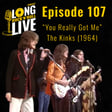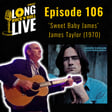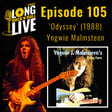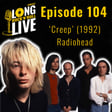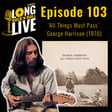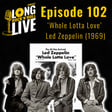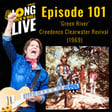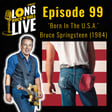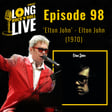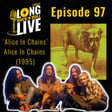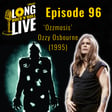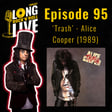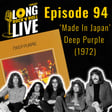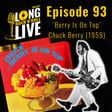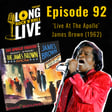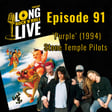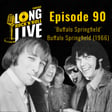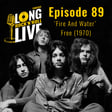Introduction and Episode Setup
00:00:12
Speaker
Hello there and welcome back to another episode of the Long Live Rock and Roll Podcast with your hosts, Laz Mikelides and Felipe Amorim. Felipe, how you doing, man?
00:00:22
Speaker
doing great man as you know I just moved to my new flat yeah so very stressful week because of that you know moving house and other stuff but yeah it's been great it's a lovely place and I'm really happy here how are you doing in the country I'm all right thank you I've been ill the last two weeks so please listeners give me a break if my voice is a bit um yeah a bit bit lower digital more manly is that it a bit lower it starts more bluesy more bluesy there we go
00:00:47
Speaker
But yeah, sink some muddy water stuff. Yeah. Glad to hear about your move, man. I mean, the moving sucks, doesn't it? But when you're in it, it's like, yes, fuck yeah, we've done it. A big achievement unlocked. Exactly. Talking about moving.
00:01:01
Speaker
You know, the album we're going to talk about. Very good. Very good. That is a pro transition.
Moving Stories and Main Topic Introduction
00:01:07
Speaker
It's about permanent waves of change, isn't it? Things are always changing, always coming waves. Love it. So if you didn't get it from Felipe's obvious hint, we are doing today permanent waves by Rush. So as usual, I'll give you the quick album info before we dive in. So the album is permanent waves by Rush released on the 14th of January, 1980.
00:01:31
Speaker
recorded in just one month between September and October of 1979 in Le Studio in Quebec, Canada. Genres, I think it's pretty safe to say now, we look back at it as a prog rock genre album, but other ones that have been associated with it are New Wave and Art Pop. The album clocks in at 35 and a half minutes long through the label Anthem, and it was produced by Rush and Terry Brown.
Why 'Permanent Waves'?
00:01:57
Speaker
And Felipe is actually the person who chose this album. Now, originally in our scheduling, Felipe, we had the album Moving Pictures scheduled in, but a few weeks ago you changed it to Permanent Waves. Do you want to... I mean, first of all, tell us why you chose this album, and then tell us afterwards why you went for this one instead of Moving Pictures. So, Moving Pictures will be...
00:02:19
Speaker
the obvious choice. We cover a lot of different bands, a lot of albums and we try not to repeat the band. God knows when we're going to be talking about Rush again as an episode. So I had to pick one album that was meaningful to me and I thought well
00:02:43
Speaker
It's the most acclaimed album and it's got like Tom Sawyer and YYZ and loads of their classics. And that would be, as I said, the obvious choice. And I decided to go for something that is not that obvious, but also one of their most important albums, maybe the album that changed the direction of their careers.
00:03:08
Speaker
And we like talking about those albums, isn't it? The albums that defined the sound of a band. And I think everything that Rush, you know what? I'm not a diehard fan, okay? So this big disclaimer, because Rush fans are really, as a general rule, they are addicted to the band. They know every small detail about the band's history. So I need to apologize in advance, because they're going to be upset with any minor mistakes we're doing in the show.
Rush's Unique Sound
00:03:39
Speaker
What I'm saying is like this album, what I can say is every album I've listened to that they released after permanent waves has something that sounds like permanent waves, you know. So it is an album that in my opinion defined what Rush is as a band. The fact you have a three-piece band playing
00:04:01
Speaker
a lot of instruments and recording loads of tracks, like doing loads of overdubs. And you listen to it, it sounds like a five or six piece. And they play everything live. They just play all of it. You listen to them live. There's no backing tracks, no, you know, no bullshit they actually play.
00:04:19
Speaker
and you can see Geder Lee using the Taurus pedal which gives him the bass on the pedal and whilst he plays keyboards and sings so like they started to experiment a lot with overdubs and adding a lot of layers and this album's got loads of it and it kind of defined the way they sound
00:04:39
Speaker
and that multi-layered music comes alive on stage up to, well, I wouldn't say up to this day, because they jammed together, they played with the Foo Fighters for the Taylor Orchestra, but up to the last day of Rush as a band, they kept that quality, you know? So I think that's the main reason. Also, it's a phenomenal album.
00:05:04
Speaker
I thoroughly enjoyed it. I have to say, I have to say it was really enjoyable.
Prog Rock Challenges
00:05:08
Speaker
And I think what struck me most was that fantastic balance achieved between the accessibility of the album and the progressiveness of it. I think you've got some obvious songs, like let's take a look. So you've got, I don't know, say Spirit of the Radio and Entre Nous. Those songs are kind of obviously
00:05:28
Speaker
I say obviously it's not overly obvious, but in the pop and progressive spectrum, those two songs are closer to the pop. And then you've got Jacob's Ladder and Natural Science, which are closer to the prog. But the middle ground in between is fantastic because Spirit of the Radio and Entre Nous both have progressive elements in it. Natural Science and Jacob's Ladder both have poppy elements in it.
00:05:55
Speaker
And I just thought that they absolutely found this fantastic balance between making songs accessible and playing intricate stuff as they used to. Prog in general is something I struggle with because when I tell someone I love a song by a band, it's often because
00:06:17
Speaker
90% of that song I enjoy in terms of riffs, okay, oh yes, I like that riff. Ah chorus, nice melody. Do you know what, the verse doesn't do much for me, but it doesn't matter because the chorus is great, the riff's great, you know, that's how I listen to and enjoy music. With Prog, when you've got 18 minute songs, there's so much not to like, I think, you know, in my opinion. So the first, the song that comes to my head,
00:06:43
Speaker
Excuse me. The song that comes to my head is that one by Yes, which has, in my opinion, one of the most memorable choruses, which is, the seasons will pass you by. I couldn't even tell you the song. Close to the edge. Close to the edge. But that song, I remember it just for that chorus, just for that melody. It's gorgeous. Couldn't tell you anything about the rest of the song.
00:07:09
Speaker
But what you've got here is you've got Rush doing the progressive stuff with the complex time signatures, with unusual syncopated hits, with extended synthesizer, middle sections, but poppy choruses, accessible
Balancing Complexity and Accessibility
00:07:26
Speaker
verses, you know, I just thought it was very, very good.
00:07:30
Speaker
That's interesting. Do you know what? I agree with you. And I had an interesting conversation today about this album. Because remember when we were touring in Brazil? You met a fella, a good friend of mine, called Tenos Acacia.
00:07:47
Speaker
So I bet you remember, I need to give him a shout because, well, this, he gave him this image to be used as a background. If you're watching us on YouTube, there's the Rush Pet Shop. There's loads of animals here. If you know the album covers, they're all part of one of the album covers of videos. So thanks, Thanos, for your help.
00:08:08
Speaker
contribution. And I need to thank him because we had an hour chat on the phone about Rush because I said he's a specialist and I need to mention his his website. So for Portuguese speakers, check it out. Super cool. Well, send me the link and I'll put it in the show notes. Yeah.
00:08:27
Speaker
Cool. Yeah. So he's one of those diehard fans. He knows everything about every lyric, every album, et cetera. So I said, I can't do this episode without talking to this guy. So one thing I was just like, I wasn't like trying to interview him and get the information. We're just chatting about the band. And one thing he said that what defines this album and what makes it different from the previous albums is not the sales because like they had
00:08:54
Speaker
some commercial hits, like in terms of sales, but they didn't have a hit song until Spirit of Radio. They simply didn't have a song that was suitable for the radio, like ironically, Spirit of Radio, or you know, it's funny.
Commercial Success and Hits
00:09:13
Speaker
So it's the first album that they had songs like Spirit of Radio, Free Will, you can't consider them as hits. And
00:09:22
Speaker
But here's the thing, they finally turned the sound, their sound into something accessible to a much bigger audience without losing the experimental side, without completely without stop stopping like flirting with prog rock. As you said, Jacob's Ladder and natural science are fine examples of prog music. And I mean, if if
00:09:49
Speaker
you know, some people might argue that's not a prog, for me that's prog, that's proper prog. And it's like, beautiful. And the other thing, everyone,
Guitar Contributions and Trivia
00:09:59
Speaker
we also discussed the fact that everyone talks about how good new Pete was, and how good Gettley has always been as a bassist, singer, keyboard player. And people seem to forget about Alex Lifeson, and he's like a huge part of their sound. And I would dare to say, see if you agree with me on that one,
00:10:18
Speaker
He is a rare case of a guitar virtuoso who doesn't go into self-indulgence. I agree with you, and although there are guitar solos in this album, most of the playing is just tasteful. It's there for what it's needed to do. I'm going to come back to what you said about Lifeson, but I just wanted to note something that, unless I misheard or didn't listen properly, and I have given the album a few listens,
00:10:48
Speaker
three minutes 55 into natural science is the first drum solo of the album, isn't it? And it's only like two bars long. It's a drum break, right? It's a drum break. So again, for a prog album, you normally hear solos everywhere, which is why a lot of me, when I was thinking about this, when I listened to the album, I got to the end and I thought, is this rock pop? Is it prog rock? Or is it classic hard rock?
00:11:15
Speaker
And no one needs to answer the question. It can be all three. You know, you can have one opinion and I can have another and whatever, we're happy with it. But I thought it's so rocky, isn't it? Just to have guitar solos.
00:11:27
Speaker
And it's so proggy having bass solos and drum solos, yet we didn't have any. Yeah, you have what you have in natural sciences. We can even call it a drum break. Normally a drum break is made out of a groove, but that's like a long fill. And again, Neil Peart in this album, it doesn't overplay. He's one of the most creative drummers in history. And I think it's really hard to debate this. And it was one of the most important drummers
00:11:57
Speaker
you know, as an influence, like he was the biggest influence of some of the greatest drummers out there, including Mike Portnoy, you know, and other great drummers. And the thing is,
00:12:13
Speaker
He's not, clearly not trying to show off. It's all about, is this film necessary for the song? Is this groove? And the groove is rock solid all the time. You know, it's very groovy in many ways. And there's an interesting point, which is like the time signature changes, which is if you actually stop and analyze the time signatures in the song, like you're never staying for too long with those guys, but
00:12:42
Speaker
flows you know it's like the melody is still the boss everything they're doing serves the melody serves the groove and it works and I think the producer mentioned that when you can have loads of different time signatures in a song and the audience doesn't notice then you know you're doing a great job this album is full of this
00:13:06
Speaker
Very good point. Where did you want to take the discussion first? Well, I have a quiz for you. Go on. Oh, three questions for you. All right. Okay. Let's go. Two of them related to the album cover. Okay. All right. Right. All right. So, uh, the model in the album cover, uh, what's her name? I forgot her name. Can I believe that? I got her name here. Let me just get it out. We need to get their name because I really want to
00:13:36
Speaker
mention her. Paula Turnbull. She is also in another album cover by Rush. Which album is that?
00:13:52
Speaker
Oh, you're asking the wrong person because I don't know any other Rush albums. But let's put this to the listeners. All right. Listen to this question for you guys. Give them the rest fans. We're going to know. That's not a question for them. That's easy for them. Right. She is on exit stage left, which is the live album they released after, if I'm not wrong, after moving pictures and that the album cover got loads of references of about
00:14:21
Speaker
other album covers, so she's in the actions in that cover. Okay, still about the album cover. I know you have a reference there that just behind you, you don't have the album cover, but you have... I think it's like one of the... I think it's like the deluxe album cover or something. Yeah. Well, it's super... Get out of the way. So the actual album cover has a man waving right at the back. Who is that man?
00:14:49
Speaker
you can't google that
Musical Influence and Lyricism
00:14:51
Speaker
no no i'm not googling the man i'm assuming him on the photo oh yes he is who is that see there's a man who is that man oh god i mean do you know what a part of me wants to say it's the same guy standing on the road on abbey road you know
00:15:06
Speaker
imagine if they got that guy in that's the guy that no one knows who he is you know that would be rock and roll's greatest conspiracy um is he famous this guy no no well uh you know you know for rush fans he's famous because he he designed loads of their covers that's Hugh Simon who is a designer who did the album cover and he just like he was cheeky enough to to put himself slot himself in
00:15:33
Speaker
The sense of humor is like, so yeah, I need to, it's, it's, you know, how to say collage montage. Yeah, any of those French words for loads of different pictures and I have the model, which someone photographed for the, for the
00:15:49
Speaker
for the cover. And you have him in the back. And the main picture is that we also get the actual name, isn't it? It's the Hurricane Carla that happened in 1961. That's one of the pictures taken during that hurricane.
00:16:06
Speaker
Hurricane Carla. So that's it. Okay, so I asked you one or two questions about the cover, right? So here's a question about a song. Alex Lifeson said that the hardest song for him to play in the whole of Rush's catalog is one of the songs from this album. Can you guess?
00:16:36
Speaker
I'm going to go with, because of what I know of Rush, which is very little, listeners, just so you're aware, I know very little of Rush. But if the idea of Rush is to always be technical, always be playing intricate stuff, I'm going to make a guess that he's struggled with the simple one. So I'm going to guess different strings.
00:16:59
Speaker
No, he struggled with the longest one natural science. Okay, I should have said the reason why he has nightmares about that song is because they did millions of takes and an interesting fact about Lifeson, he doesn't like doing many takes of the same song. He's a very creative musician and he likes to be in, you know,
00:17:24
Speaker
And as people say in the zone all the time, in the moment, creating all the time. I know, when we're in the studio, once you get, I mean, we're good at our jobs, aren't we Felipe? So we were off to do that in a few days. Well, if you say so, you know, there's no evidence of that. But you remember that one. When you listen to an album, we don't know how many it takes with it. So we can all explain that we've done all of our albums with RMT.
00:17:47
Speaker
but in real life you do go over things multiple times and you do do multiple takes and as you know we were stuck on a bar for that last album we did together we were stuck on one bar of music that was going from one tempo to another
00:18:04
Speaker
and we were there for hours, weren't we? Probably two hours trying to figure out one bar of music. We tried to write it down, memorise it. And I imagine with a song like Natural Science, you have loads of parts where you might have endless arguments about one bar, one bass phrase, one guitar solo. Sorry, my point was that
00:18:25
Speaker
once, if you're going into the first take and you're there like, oh, this is brilliant. Yeah, I'm really vibing. If you keep fucking it up and you're on the 10th, on the 10th take, for example, if the song starts to lose its appeal to you, you get a little frustrated, don't you? You're like, oh yeah, sorry again. So this, what you're saying is exactly what I, what I, uh, read on this, uh, interview with Lifeson, because it's like you said, I don't like doing too many takes.
00:18:51
Speaker
of the same song. I liked the one or two takes get like that really fresh approach approach of the song and just get it get it done. Yeah. And so he struggled a lot with that one with the fact that he had to do many takes of that song. But okay. So do you know what I'm gonna I'm gonna give you a fourth question. Why bonus question? Why not? Bonus question. That's worth twice the price price the amount of points of the other ones in which
00:19:22
Speaker
UK studio was this album mixed. Oh, I didn't even know. No, I've read something about it today, but I'm not going to be able to remember it. Oh, shit. I'm trying to remember where it was. Was it in Wales? London. Which one then?
00:19:44
Speaker
You know what? I'm just moving away from this place. It's right behind the place I live. I saw Trident Studios. David de Barrie recorded that. There are loads of famous rock stars recorded there. Oh, brilliant. They mixed it out of the studio. They mixed it there because at the time they were recording the album and touring the UK.
00:20:08
Speaker
So they recorded in Canada and they came to the UK on tour whilst the album was being mixed. So they mixed it here. I tried in studios, iconic studios in Soho. Every time I go to the bakery next door to the studio to just get some coffee, I see the tourist guides with loads of people talking about the studio and making up loads of stories that are not real.
00:20:37
Speaker
As is the way with London. For 100 quid a day you can have a really nice trip around Seoul with someone telling you fake stories about famous bands. Anyway, where do you want to go now? Just talk to him about the music? I'm the boss today, isn't it? You are the boss, yeah. I said to Felipe, I said, listen, I'm a little ill, you chose this album, you know it better, why didn't you navigate it? And he's completely taken advantage and he's wearing his boss hat.
00:21:02
Speaker
And she was shouting instructions at me before we record that, joking. But yeah, yeah, Felipe's the boss today. There's a couple of subjects I want to talk about. The band itself, like as I said, everyone talks about Geddy Lee and new periods about, you know, how good they are as instrumentalists.
00:21:21
Speaker
And you have this amazing character who is Alex Lifeson, who's got like this brilliant sense of humor. If you watch any of the interviews, it's impossible to not have a laugh when you listen to it with your Lifeson. He's just so funny. In one of the interviews I sent you, I don't know if actually, I don't know if it was him or getting lead, but they were talking about Neil Peart's, is it Peart or Peart's?
00:21:43
Speaker
I think it's Peart. That's how he pronounced it. They were talking about Neil Peart's lyrics. And they said, Neil, you know, do you find it? Is it? Is it? Is it something like, you know, you do the lyric writing? What about the other two? I think Alex Leifson said, Yeah, well, I can't read. So
00:22:00
Speaker
The fans can correct me if it wasn't the Rock and Roll Hall of Fame or something. They got like one of those awards or whatever inductions, whatever that is. He went on stage to talk.
00:22:19
Speaker
to thank the audience. And all he did was to say blah, blah, blah for like three minutes or so. He told the whole band's story with blah, blah, blah, blah, blah, blah, blah, blah, blah, blah, blah. I just kept going on and on. And the other two guys were like at some point a bit embarrassed and then laughing. It was like, where are you going to go with this? I think the three of them were there or maybe it was just him and Geddy Lee. I don't know. But it's like he's hilarious.
00:22:47
Speaker
So here's the thing, I believe that their personalities and their characters are a huge part of their sound. So when you can be that good at your instrument, and on the other hand, you don't take yourself too seriously,
00:23:02
Speaker
So it opens up a lot of avenues, doesn't it? It does, it does. And I think at the time they recorded this album, I think they had families, they had kids, they're like, you know, it's another moment of your life. Seventh studio album, by the way, seventh. Yeah, that's quite far in. They were successful before this album. I kind of imagine they were a bit of a cult band, you know, they had a dedicated following.
00:23:27
Speaker
Yeah, yeah, they're selling really well, they touring the world, but this album took them to bigger venues, like better ticket sales.
Favorite Moments and Lyrics
00:23:39
Speaker
Apparently the tour before the ticket sales were not great, so they even considered to quit and call it a day and rush would be no more
00:23:48
Speaker
on this album kind of changed everything. So yeah, so again, about the sound of the band, they like experimenting with new technologies and everything that is available. And you can see the natural science has got a lot of that. And they use technology to, you know, to the limit, I would say, as long as they are operating it. So it's not the machines taking over, it's them actually doing everything.
00:24:13
Speaker
and that's another big part of their sound. Now I like to talk about the things that people normally overlook or don't take into consideration when they're talking about Rush. So everyone talks about Nupiat as one of the greatest programmers of all time. Do you agree with that?
00:24:35
Speaker
I do. He changed the game for for drummers. The fact that you have those huge drum kits everywhere and you have you know the electronic components of his kit like that was a big part of his sound and he started that like I think Bill Bruford did a lot of that in the probably I think I don't know if late 70s or early 80s when electronic drum pads started to be available for touring musicians and
00:25:01
Speaker
studio musicians. And Neu Peart and Bill Bruford were some of the the drummers who actually made it popular. So he was always like into the technological side of it, but also he did a lot of historical research. One of his favorite drummers was Buddy Rich. He organized, if I'm not wrong, he organized a Buddy Rich tribute album and concert. And so he was into jazz and all sorts of stuff. Phenomenal drummer, but
00:25:31
Speaker
My favourite thing about Rush is by far their lyrics. By far, above all. And I'm pretty sure that a lot of the Die Hard fans are going to agree with me that New Peart is one of the greatest lyricists of rock history as well. And that's one point that most people don't even touch. Yeah, I was surprised to find out he was the lyricist. I kind of assumed it was Geddy Lee, but
00:25:56
Speaker
No, Geddy Lee, I might be wrong about this, you might be able to Google it or not, but I think Geddy Lee only wrote one song, the words for one song with different strings. But that's the only one, it's beautiful, by the way, it's beautiful lyrics. So Neopit, he went into the more philosophical side of some writing. I think it became more solid from this album, because they go into the, how can I put it?
00:26:25
Speaker
A bit of storytelling back in the day, a bit more subjective. I think that's the word. They became a bit more philosophical and objective in talking about humans and talk about the human condition and feelings and thoughts and human interactions in his album. The fourth song, is it Entre Nous? Is that how you pronounce it? I think so, yeah, Entre Nous. That's good French. If it's not, we can just pretend it is.
00:26:52
Speaker
So Entre Nous is, for me, again, that's my interpretation, is about any relationship between a couple or two friends and about leaving the right amount of space. It's really hard to find that balance in human interactions. How close should we be? I'll just tell you what Entre Nous means in English.
00:27:15
Speaker
between us. Oh, you know, yeah, I was going to say that's great because you said the space. My language is still, yeah, exactly. My language is based in Latin as well. That's a cheat code. It might be.
00:27:32
Speaker
So that song is, yeah, it's a simple song compared to the rest of the album in many ways, but the lyrics are beautiful. Now, Free Will, and I think I sent you, and I want your King's English. Do we say King's English now after the Queen's gone? Yeah, we don't say Queen's English anymore, so we have the King's English. So I want you to read that bit from
00:28:01
Speaker
uh free will and i want to discuss one is it the first wait a minute wait a minute i think is the uh give me the first word oh wait a minute wait a minute wait a minute i sent it uh so you know what what happens what happens when i okay got it so free will will be the second oh oh no each of us no no sorry you can choose a ready guide that's the one cool all right
00:28:28
Speaker
You can choose a ready guide in some celestial voice. If you choose not to decide, you still have made a choice. How simple and profound is that? That's lovely. Yeah, lovely. Isn't it? And I remember reading one of Nieupiot's articles or interviews, or don't remember exactly what it was, and he was talking about how he, he was fascinated about
00:28:53
Speaker
collectivism and the fact that people, you know, they tend to be attracted to political groups or religions and all that stuff. And he was, well, here's the thing we talk about some very rarely we talk about the political side of some writing here. And we live in a world where you have the clear left and right wing policies and most people affiliate themselves with one on another.
00:29:17
Speaker
and sometimes that's reflected in musicians' lyrics and ideologies, and you appear as one of the libertarian songwriters I know, or if not the only one, the only one who'd clearly reference libertarian ideology and political views in a song, and which
00:29:38
Speaker
means in a simple way he talks a lot more about individual choices than collective decisions.
Vocal Distinctiveness
00:29:46
Speaker
But here's the catch, that's the thing I discussed with Tenius in the phone call, so again thank you for your help Tenius, is the fact that he's not saying, you know, abandon all of the ideologies out there,
00:30:00
Speaker
and do whatever. It's like, okay, you're gonna make your own decisions, but you're responsible for your fate. You know, so it's the embodiment of libertarianism, isn't it? It's like, you're a free man, you go, you do you, but be aware that you are
00:30:18
Speaker
like, responsible for the consequences of your choices and no one else's, you know, and it's and it's that's a really, really powerful statement. And when I love that if you choose not to decide as to have made a choice, escape the fact that you an individual, and you have to deal with the consequences of your choices. Yeah, you know, so that's that. And that's like, I think that that sort of songwriting appeals to everyone.
00:30:46
Speaker
who stops to listen and read the lyrics, I guess. It's really powerful and it's very unique. So I think what makes them, what they are as a band is first of all, Nio's lyrics and second, Geddy's voice. Geddy Lee's voice. And then there's one thing, some people hate it, some people love it. There's pretty much nothing in between. Well, you know what? I'm sorry to fuck up what you just said, but I'm kind of in between.
00:31:14
Speaker
I'm definitely more towards liking it. And I tell you why, it's because I feel it's appropriate and it works with the music. A voice I struggle with and I wish I didn't struggle with it because I wish I liked the band more was Dream Theater, which we've done before. I feel his voice is very similar to Geddy Lee's, but it's too soft and it's too high pitched. And for me, it doesn't match the music that Dream Theater put out. Whereas Geddy Lee,
00:31:43
Speaker
it works really nicely. And I think it comes because of the accessibility of the music. Just to say that those vocals on the outro of Free Will, my God, like, you know, when he's just shouting, I don't want to say shouting, it's probably not the correct vocal term, but properly projecting his voice, almost screaming. It's wonderful. Now, something I read, which you might be able to tell me about is that it said that, they said with this album,
00:32:12
Speaker
Geddy Lee restrained himself vocally. Apparently he reigned it in. So what I took from that is that he's way more adventurous on previous albums and he's much more controlled here.
Song Analysis: 'Spirit of the Radio'
00:32:26
Speaker
Is that something you agree with? Yeah, I do. If you listen to Fly By Night, which is their second album,
00:32:31
Speaker
I think it's the first one with new period on drums and they are, so his vocals are way more aggressive. Can you give me one song? The song for that by night. Okay. Great example. Listeners as usual, any song we mention will be in the playlist which you can find in the show notes below.
00:32:49
Speaker
Yeah, but listen to the whole album is great. And the thing is, so he was, I would say that his vocals resemble a little bit of Robert Platt, not the nature of his voice, the tone of his voice, but the fact that he could go
00:33:05
Speaker
to a really high note and sound raw and aggressive when he wanted to. And in this album, he's even more melodic, and I think he's kind of exploring the low tones a little bit more. And I like different strings. That song is not designed to be an impressive vocal performance, isn't it? He's serving the melody. It's technically beautiful. It's melodic, and it suits the song. He's not shouting.
00:33:34
Speaker
Yeah, I love music that does that. I love music that uses the vocals as another equally as important instrument and not, oh look, I'm the vocalist, it's all about me, you know. Yeah, exactly. Do you have like any, here's a question, because we're approaching pretty much all of the songs all at the same time here. I have, there's a few moments in the album that I find, I want to go, I had this on CD, so I would go back
00:34:01
Speaker
you know and listen to it again I was like so moments on the album because like the drum and bass unison phrase at the beginning of spirit of radio is absolutely insane yeah I've got that written down the hits the syncopated hits really unusual and and it's so in sync based on you know there's no there's no editing to that it's not like modern days yeah no no everything to the grid they actually play in it
00:34:28
Speaker
I think there's only six songs, so I feel like it's okay for us to go through them and just say what you liked about them. So let's start with Spirit of the Radio. As you mentioned, those hits at the start, I thought they were wicked because the straight off the bat, you've got that, which could be like a bloody queen intro, couldn't it? Very kind of, you know, with that poppy vibe. It's just kind of contrasted with these really progressive, syncopated hits. Before it descends into that,
00:34:59
Speaker
which again I think that's kind of Queenie but on the way more of the metal side of Queenie you know some of those hard rock riffs they wrote and it does sound like their previous
Deep Dive: 'Free Will' and 'Jacob's Ladder'
00:35:09
Speaker
albums that kind of riff yes okay yeah and then they break into something completely different isn't it?
00:35:15
Speaker
Well the verse, now the one song, again I'm just going to add it to the playlist now, the one song that I completely hear in the verse of Spirit of the Radio is Don't Stop Believing by Journey. Spirit of Radio, you added off the radio. Oh my god, they're going to cancel us. They've turned off, the Rush fans have turned off.
00:35:36
Speaker
Let's not insult them too much because we do need them, we want them to listen. We're joking because they are the, I actually, I admire the band and I admire the fact that people can be so committed to, you know, to enjoy one band like this. But yeah, the verse of Spirit of the Radio almost follows, I could be wrong here, but it feels like it follows that chord progression of Don't Stop Believing by Journey.
00:36:01
Speaker
And I just found that really interesting because it shows the accessibility. What does everyone love about that Journey song? It's so simple. The melody is so simple. The chords are easy to follow. And I thought we've just had this incredibly diverse and dynamic intro where, you know, like I said, you've got that really produced guitar, followed by those syncopated hits, followed by a kind of hard rock riff. And then it just descends into a very simple verse.
00:36:26
Speaker
Yeah, I really enjoyed the verse of that song. And the one thing I wanted to pick up on is the lyrics of that song because there was one lyric that really, I really enjoyed and that was, let me just find it. All this machinery making modern music can still be openhearted, not so coldly charted. It's really just the question of your honesty. Yeah, your honesty. One likes to believe in the freedom of music.
00:36:56
Speaker
I love that. It's like a very obvious complaint about the way music's going, you know, like he really is just saying, I don't like, you know, the whole song's kind of about that vibe though. Do you want to expand on the lyrics of Spirit of Radio? Yeah, because I think it does talk about the power of music, you know, making your day better, making you feel good, going to work. It sounds like there's a person going to work listening to the radio as well.
00:37:22
Speaker
yeah you know there is magic at your fingers and so you you're turning to the radio choose the song you want to listen to and that makes you feel better but it's a lovely concept isn't it this song i love the idea of it they also talk about uh um the uh the commercial side of music and how you can uh kind of sell your soul to the devil as as a band isn't it right and become more commercial it's funny is they're almost criticizing something they they kind of did
00:37:52
Speaker
In their defenses, and that's the beautiful thing about Russia, they were not trying to write a hit.
00:38:03
Speaker
At that point in their career, like many other bands, some bands reach a point, okay, we're fairly successful so far, why not try to write a song that's gonna make everyone sing along? They were not trying, so that's how committed to their art they are. So this song is a
00:38:24
Speaker
a pretty cool approach on the music industry and on the music listener, I think, is the fact that, you know, what does music represent for people as well? Really beautiful. I like it. What about the, when it goes back to the progressive section, about three minutes 40 into the song.
00:38:43
Speaker
And then it hits the reggae vibe. Oh man, do you know they were really influenced by the police? Do you know what man, I'm so glad you said that because I was just thinking around the same time the police were combining rock, new wave and reggae. And they were listening to them, yeah. They were listening to the police, that's why.
00:39:02
Speaker
Um yeah it shows doesn't it? The middle prog transition and this is this I think this is quite an important point the middle transition of this song where it goes back to the proggy part just the way that the instruments work together all playing in unison with even with the drums rhythmically playing as well it really reminded me of early Iron Maiden and I'm gonna put the song Phantom of the Opera in the playlist now because that's the one that I thought of first but I can really you know
00:39:31
Speaker
The reason why I said it's a really important point is because Rush had a massive influence on heavy metal in the eighties. Now I can only, you know, I'm a hundred percent sure that bands like Dream Theater would have taken direct influence from Rush. Oh, they did, yeah. Prog bands like Opeth as well, you know, but I'm thinking more non-linear, not straight from the progressive
Exploring 'Entre Nous' and 'Different Strings'
00:39:57
Speaker
side of it. And bands like Iron Maiden,
00:39:59
Speaker
I believe would have had an ample reason to listen to bands like Rush and take influence from them. Do you know who listened to them a lot and were highly influenced by them? Maybe it doesn't sound like Pearl Jam and Pearl Jam. Oh really?
00:40:17
Speaker
really and the Foo Fighters. They're not prog, those guys are not prog. Exactly. But I just wanted to say that I'm maiden because I've obviously got to get my two minutes of heavy metal in.
00:40:32
Speaker
You gotta do it, isn't it? I have to, I have to. It's like you and your blues. That's like a segment. Just the buzzer goes off when I mention heavy metal. Large heavy metal minutes. There you go. But I did really feel, you know, a lot of the
00:40:48
Speaker
A lot of the heavy metal journalists, especially the ones who are slightly older, will always put Rush albums into an extensive, okay, you want the best heavy metal albums between 1970 and 2020, Rush will be in there somewhere because those people
00:41:05
Speaker
definitely believe that Rush had a big impact on metal. And I haven't, excuse me, I haven't studied Rush enough to be able to make that comparison myself, but a number of notable heavy metal journalists have made those observations, so I can't help but just, you know, fine, I'll trust them, you know. But yeah, anything else about Spirit of Radio?
00:41:26
Speaker
Well, I think we can move on, talk about Free Will. Yeah, we did Free Will, didn't we? I mean... Yeah, we did talk about it, yeah. I think... Go on, please. Although the one song we didn't talk about yet was Jacob's Ladder. Oh, you are right, yeah, yeah. But Free Will... Yeah, Free Will. I liked the... What have I put here? So, yeah. Despite how intricate and how layered the song is, I don't know if you agree with me,
00:41:57
Speaker
The song and the album does feel produced. It feels like a lot of time and technology has been used to make this album sound good.
Analysis of 'Natural Science'
00:42:05
Speaker
But when you get to three minutes into free will and you've got the bass playing on its own, the bass sounds so raw, man. It sounds so good. They're just before the guitar solo, isn't it? Yeah, it's about three minutes in. Yes, you're right. 15 seconds before the guitar solo. But it just...
00:42:23
Speaker
it feels like the kind of bass you'd hear if you were just listening to either a punk album or a very raw rock album. It's not the tone of bass I'd expect to hear on a very well-produced progressive album and even 15 seconds later the guitar comes in. My point is that
00:42:46
Speaker
moments in each of the songs, despite the technology used, despite the synthesizer, you can still just imagine one man pressing down on a pedal and making that guitar noise. One man, you know, slamming on his bass guitar to get that tone. It doesn't need to go through all the computers and all the processing. Yeah, no, no, exactly, exactly. They have that raw power, isn't it? And it's just a fantastic contrast to the really great electronic stuff they do as well. Definitely. And again, about that point of the song,
00:43:15
Speaker
I love the way that they do that in a few songs. When this album is very clear with Free Will, they change the vibe completely to prepare for the guitar solo. I love that. It's like, come on guys, stop and listen to our boy Alex. He never gets enough credit. He never gets enough credit. Let's give him this one. It's super cool that they kind of change the beat, change the bass line. They change the mood of the song. And I think even the chord progression and then the guitar comes in and just
00:43:45
Speaker
Smashes it. And it's not long. It's not a long song. It's not a long song. It's effective. It's effective. Jacob's Ladder. I mean, very progressive off the bat. I mean, not ultimately, not like the most progressive song you've ever heard, but it is progressive compared to the first two, isn't it?
00:44:02
Speaker
much more atmospheric and I think again that just glows hand in hand with the progressive feel of it. I love the marching band style at the beginning with this very of the snare drum it's just like it's very and it's so subtle there's way more dynamics and so basically that's whatever every drummer knows that
00:44:20
Speaker
all drum techniques they come from the tradition of rudiments which are these ne'er drum techniques. So that was kind of translated to the whole kit. But that one piece of drum kit, the one drum, there is kind of the beginning of it all for drummers is this ne'er drum and good drummers can make
00:44:41
Speaker
a hell of a sound with that one piece. And you hear that on that song. And it's very different to the other stuff that New does in the rest of the album. But just that one snare, doing a marching band kind of vibe, building the tension for the song. I think it's in a tricky moment in the album is after two bangers like those.
00:45:05
Speaker
those opening tracks. It feels to me like they had to say, you know, come on, guys, we've got to we've got to do something towards our progressive roots. You know, I liked it. I thought it was really quite heavy in nature. And I'm not saying heavy in the terms of heavy metal or like heavy rock. I just mean in nature, the rhythms were heavy, just that that stomping rhythm at the start. The chord choices, they were quite dark. You know, the instrument tones as well. And I love that the song builds in intensity kind of takes you on this journey. And
00:45:33
Speaker
Like I said about the bass tone in the previous song, I really loved how the first half of the song was kind of really raw, very rock and roll, and then the middle section comes in and it's way more produced and electronic. But it wasn't stupidly noticeable.
00:45:53
Speaker
No, no. And I think it flows as well, isn't it? I think the reason why those songs are shorter in this album compared to the previous albums is they got to a point they could transition from one part to another in such a natural way.
00:46:11
Speaker
that you can have a lot of different parts in a shorter song without having to have a three-part song that lasts for 17 minutes. They've managed to be more straight to the point in a certain way. They've executed it using less than what other bands have needed to do before. They've really found a nice way to keep their songs concise
00:46:42
Speaker
confined, but still achieving the label of progressiveness, isn't it? Yeah, really good stuff. Entre nous, good, way more refined and classic Rocky, isn't it? Just kind of has that very simple kind of rock riff going on.
00:46:56
Speaker
I love the way that the acoustic guitars come in in the chorus. It's like instead of getting heavier on the chorus, it's just like my favorite Black Sabbath song, Sabbath, Bloody Sabbath, when they go to their chorus. It's like a complete turn it on its head.
00:47:13
Speaker
when you think of like the metal ballad and a Metallica song like Fade to Black where it's got the acoustic guitar and it gets soft, soft verse, heavy chorus, soft verse, you know, but that's how you kind of work with a lot of rock songs, but to just completely turn it on its head and have the verses kind of heavy and then go softer for the for the choruses. I always love it when they do that.
00:47:36
Speaker
Yeah. And they, again, it's unpredictable, isn't it? You think you're going to have a punchy chorus and they're just like, nah, we're going to do whatever we think we should do. And Russia is really good at that. Just the fact that they're not trying to write a hit, they're not trying anything. We said the same about ZZ Talk, isn't it? Those guys are not trying really hard. They're just like, you know what, this is who we are musically and we're going to do it like this. Exactly. Yeah. What about you, Andrei, anything you wanted to say?
00:48:04
Speaker
No, that's I think that covers it all. I think the next one is different strings, isn't it? That's the one. Yeah, yeah. Closest thing to a ballad they did on the album, isn't it? Really nice. They're really nice and soft. I thought it was actually probably the most produced one of all the songs in terms of having that 80s
00:48:23
Speaker
overproduced electronic kind of vibe to it. I really loved the outro about three minutes in. You know, what does, hold on, something happens there. Let me just have a quick listen. It's just a stomp, isn't it? Or something like that. In what part? Oh yeah, it's just the outro of that song goes, oh yeah.
00:48:50
Speaker
Well, one note, man, one note, and it feels so heavy. I was thinking, oh, that guitar tone. And it's just one note.
00:49:01
Speaker
So slow, man, but I really love that. And then again, there's a similar kind of theme to the lyrics that if you compare to Entreneux, which is, you know, again, human connections and, you know, what they say is that different eyes see different things, different hearts beat on different strings. I think that's the verse. I hope I got it right.
00:49:25
Speaker
uh so basically it's like yeah you have a different you are a different person so you can't see the world in the same way i see so that's my interpretation of it it's nice and and although there is that oh yeah oh actually i have the lyrics here different eyes see different things different hearts beat on different strings but there are times for you and me when all such things agree and that's like it's just lovely lovely lyric isn't it so i i must say that this is my favorite song on the album
00:49:55
Speaker
Yeah. And again, I'm really surprised by that. I have to say, man, because that's what get his get these lyrics, different different like writing style. Yeah. And you get into that point in the album, you are already mesmerized by their musical abilities. And it's like, my God, how can they come up with such complicated yet interesting parts? And then they just
00:50:22
Speaker
They eat you with this one. They throw this ballad on you. That is such a beautiful piece of music. That's a great point, man. Ianno and acoustic guitar and they're like, what, is that it? Like, you just, you just got to make me cry now, is that it? Lovely. It's beautiful. I love it. Love it. And the last song. And the last song, Natural Science, clocking in at just over nine minutes. They actually split this song into three parts, you know, officially. So part one is called Tide Pools, part two is called Hyperspace, and part three is called Permanent Waves.
Rush's Influence on Prog and Rock
00:50:48
Speaker
I've just got four minutes, uh, four
00:50:50
Speaker
notes here about certain sections of the song. Two minutes in, they're quite uneasy rhythms. It's kind of got a bit of a Latin vibe. Let me just put it on so I can
00:51:03
Speaker
So really rushing, you know, the rock music likes to be on the beat. So for it to push. Just a bit progressive. Two minutes 20 after that part comes in a riff that I thought was very, very heavy metal, like really nice, really distorted, really heavy.
00:51:24
Speaker
I already said it, three minutes 50, three minutes 55, the first drum solo of the album. Yeah, which is just that two bar break. Yeah. And it's beautiful again, like, it's like, yeah, new new appear to have that thing when people give him a short break in a song like a bar or two. And he fits a ridiculous amount of drum sounds into that small sequence. And he's just
00:51:50
Speaker
It just works, it's not. For me, he never sounds like he's over playing. It actually took me by surprise, which I thought, hold on, it's a prog album and that drum break took me by surprise. The other thing is the guitar solos. Proceed with your notes. I don't want to break your system. I was just going to say five minutes 30 in that goes to like a fast waltz.
00:52:18
Speaker
It's really unusual, but I just thought the way that they transition song to song, within each song, when they go to different sections, I just love it, man. I think they do it so perfectly. It never feels out of place. It never feels like, oh, right. Well, they forced, they tried to put in like some fast waltz here and they've done it on purpose. It always feels like the song naturally moves that way. It's lovely. Because again, I think it reflects their personality and their, you know,
00:52:45
Speaker
Um, they are intellectuals, you know, they, they, they, they are clever people. So they, they think in that way and they write in that way, but they're not just like, Oh, look at me trying to be clever. It's just, it's just who they are. Yeah. Great stuff, man. That's, that's all my notes on the songs. That's all the parts I didn't say. I want to ask, please, please. No. Okay. I was going to ask you something.
00:53:08
Speaker
This to me and my knowledge of Prague is very limited compared to like my other stuff I know about. I feel like when you associate, when you talk about Prague in the eighties, I think everyone kind of sighs and rolls their eyes because you think of Genesis going way more poppy.
Impact of Album Length
00:53:27
Speaker
Yes, probably went a bit poppier as well, didn't they? Do you think, would you say this album is responsible
00:53:38
Speaker
I don't want to call it the downfall of Prague, but they so obviously showed us here how you can make Prague radio-friendly. But it's not silly pop music, isn't it? No, it's not, but it's accessible.
00:53:55
Speaker
So what I'm asking is, sorry, let me just ask, let me just finish, because I want to ask you the proper question. Linking what we did, I'm trying to think what, what, what prog albums have we done? We did Genesis, didn't we? Taking England, but 76, right? 1976. So Genesis. So they can power his first album. Okay. So from those to those same bands in the eighties,
00:54:21
Speaker
It just has kind of dawned on me that permanent waves sits in the middle. Do you think permanent waves is that catalyst to Prague becoming way more poppy? No, because I don't think anyone followed Rush. So here's my opinion, this is not a Prague album. Wow, hot take. It's got two Prague songs. You could call them Prague, which is Jacob's Ladder and Natural Science.
00:54:50
Speaker
This is a Rush album. It is one of those cases that a band sounds like themselves and nothing else. The thing is, I don't think the album itself has changed the way that all the bands could have done
00:55:08
Speaker
I don't know, at their own albums. I think it has influenced musicians in a deeper way. Like how do you approach your instrument? How do you approach songwriting? But I wouldn't say that Frog bands were even listening to Rush. Yeah, I think Rush is fresh. I think they do sound like themselves and they were making a point in this album, like this is who we are as a band. And I don't think anyone can sound like them. So. Brilliant. And I don't think,
00:55:37
Speaker
I think it's one of those cases, you can't just call it prog or hard rock. It's rock. It's rock music for sure. But what kind of rock, which could just be debated and that would be just words, isn't it? They have a particular sound that no one else has. And in that album that was made
00:55:52
Speaker
crystal clear. If you still didn't understand that Rush has a sound of their own, when you listen to permanent waves, you get it. And here's the thing, Rush is one of those bands, I'm pretty sure you think the same, it's one of those bands, if you're a rock fan, you've heard of them.
00:56:12
Speaker
And you've heard about the influence and the importance and you're like, Oh yeah, cool. Have a listen one day. And you listen to a couple of songs or an album and you kind of understand why people like them, but you still kind of don't get into it. It's too much for you, too complicated, too specific. If you want to have a go at one Rush album, if you want to try, if you want to taste how Rush feels like, this is the album I would recommend.
Final Thoughts and Wrap-Up
00:56:39
Speaker
stuff man. Do you have any further points you want to talk about? I just want to hear a monologue if you have one. Yeah of course I do. Yeah yeah so you don't want to say anything else? No no I don't want to say a lot of things but you know life is too short. I'm gonna do something else today. Well do you know I will just quickly add that in terms of the reception it was their most successful album at the time of release so when it came out you know it just took over it became the most famous rush album of that time.
00:57:04
Speaker
A quick point that's going to relate to my monologue is Alex Lifeson said he was unsure about the album when he first listened to it. He didn't know if they'd done the right thing. In the terms of the charts, it went to number three in Canada, number three in the UK and number four in the US. So I think it did pretty well commercially. But yeah, as for my monologue, it's quite a short one, but I feel like, you know, there's one big point that I make.
00:57:27
Speaker
Both the instant and lasting effect of permanent waves on listeners draws me to the same conclusion. This is an album that should be played and heard on the radio, but it should also leave music appreciators very impressed. The balance struck between intricate progressive music and radio-friendly accessibility is very impressive.
00:57:46
Speaker
I can understand Lifeson's unease about the album upon his first listen. At times it can feel too poppy, too synthy, too much of a sellout. And then others, it goes the other way from what you think they're trying to achieve and say, well, are these songs, you know, Jacob's Ladder, Natural Science, too progressive? But one fix ends up solving both of these problems. And that is the length of the album.
00:58:09
Speaker
It is far better to be left wanting more than to have too much of an average thing. Clocking in at 35 minutes, I think there is the perfect amount of everything. It's not so poppy that it gets us talking about, oh, well, did Rush sell out? It's not so synthy that we're saying, well, is this a typical 80s album? And it's not so progressive that we have to talk all technical when trying to understand the music.
00:58:34
Speaker
It restrained and controlled itself on each of those aspects and probably unintentionally ended up creating a prog rock masterpiece because of this. Because for me if there were any more songs of either type, any more prog or any more pop, I probably wouldn't have enjoyed it as much as I did. There was just enough of everything to make me come back for more and I certainly will be coming back for more of this album.
00:58:59
Speaker
Brilliant. Man, you shouldn't have released a book with your monologue. We'll do that. Yeah, we'll put the little monologues in each of the little things. Like the little quote at the bottom of the page.
00:59:14
Speaker
I think I just really wanted to home in that point that I think if this had been an album that was 56 minutes long I don't think I would have enjoyed it because it would either have been too many pop songs or too progressive but the fact that they just stuck with six songs only two of them are over five minutes or something like that
00:59:33
Speaker
Yeah, nine minutes, I'm going backwards. Nine minutes, three minutes, four minutes, seven minutes, five minutes. So yeah, only two songs are over five minutes, 20. So maybe they did that on purpose, maybe not. I really like to think they said, maybe we have got three or four more songs we could put on, but let's just keep it like this. But yeah, excellent stuff. One more final point for me to ask you. What is rock and roll about this album?
01:00:03
Speaker
I think the constant search for something, some sort of sound that you haven't made before, some sort of song structure that you haven't achieved or a lyric that you didn't write on the previous album, the fact that you're seven albums into your career and you think we can do something completely different this time. That's a great point, man. Yeah, great point.
01:00:29
Speaker
Anyway, right, we'll call it a day there. So thank you very much listeners and viewers if you're watching on YouTube for joining us. As usual, please find us on the internet. We are at Long Live RNR Pod on all of the sites, Instagram, Facebook, YouTube. If it's there, we're on it.
01:00:44
Speaker
Actually, that's not true because we're not on Twitter or threads or whatever the new ones are. But we're on the important ones. So please go there. Give us a like. We're somewhere on the internet. There you go. Give us a like. Give us a follow. And please, if you're listening to us on Apple or Spotify, we just need 20 seconds of your time. Head to the show. Go down and review us. Tell us your thoughts. It just means the world of difference to us. So thank you very much for joining us. Thanks a lot for being with us one more time. And keep on rocking, everyone. And don't do anything I wouldn't do.
01:01:13
Speaker
love it and as usual take care guys and long live rock and roll.

